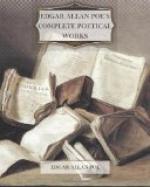Edgar, the second child of David and Elizabeth Poe, was born at Boston, in the United States, on the 19th of January, 1809. Upon his mother’s death at Richmond, Virginia, Edgar was adopted by a wealthy Scotch merchant, John Allan. Mr. Allan, who had married an American lady and settled in Virginia, was childless. He therefore took naturally to the brilliant and beautiful little boy, treated him as his son, and made him take his own surname. Edgar Allan, as he was now styled, after some elementary tuition in Richmond, was taken to England by his adopted parents, and, in 1816, placed at the Manor House School, Stoke-Newington.
Under the Rev. Dr. Bransby, the future poet spent a lustrum of his life neither unprofitably nor, apparently, ungenially. Dr. Bransby, who is himself so quaintly portrayed in Poe’s tale of ‘William Wilson’, described “Edgar Allan,” by which name only he knew the lad, as “a quick and clever boy,” who “would have been a very good boy had he not been spoilt by his parents,” meaning, of course, the Allans. They “allowed him an extravagant amount of pocket-money, which enabled him to get into all manner of mischief. Still I liked the boy,” added the tutor, “but, poor fellow, his parents spoiled him.”
Poe has described some aspects of his school days in his oft cited story of ‘William Wilson’. Probably there is the usual amount of poetic exaggeration in these reminiscences, but they are almost the only record we have of that portion of his career and, therefore, apart from their literary merits, are on that account deeply interesting. The description of the sleepy old London suburb, as it was in those days, is remarkably accurate, but the revisions which the story of ‘William Wilson’ went through before it reached its present perfect state caused many of the author’s details to deviate widely from their original correctness. His schoolhouse in the earliest draft was truthfully described as an “old, irregular, and cottage-built” dwelling, and so it remained until its destruction a few years ago.
The ‘soi-disant’ William Wilson, referring to those bygone happy days spent in the English academy, says,




